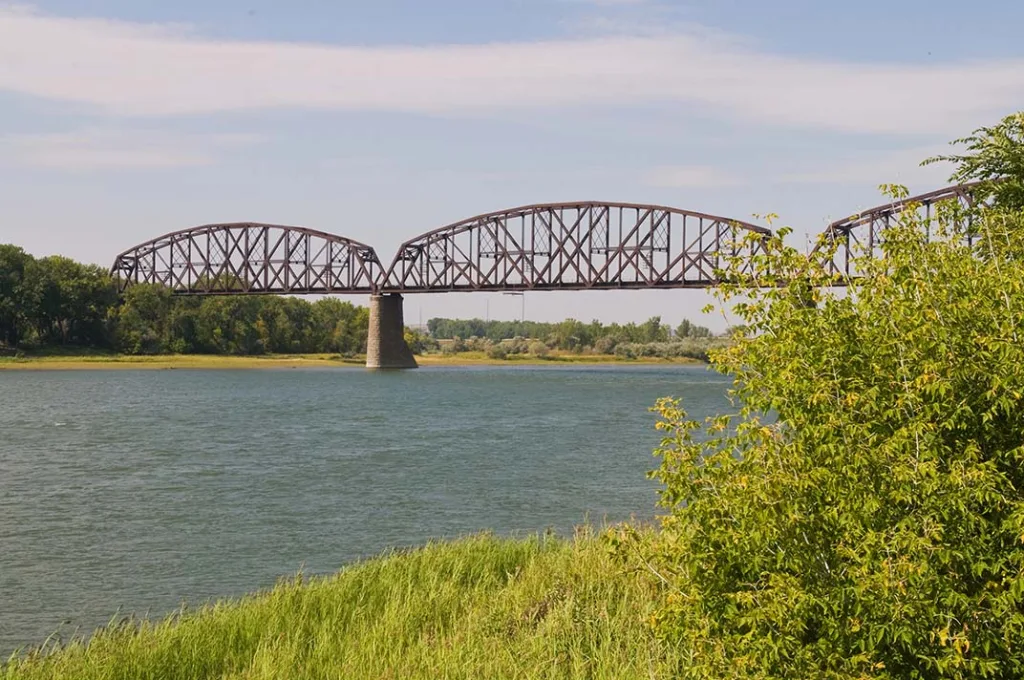

By JEFF BEACH (North Dakota Monitor)
Summit Executive Vice President Wade Boeshans cited Summit Carbon Solutions paying more than $14 million annually for electricity to operate its carbon capture and storage project as an economic benefit to North Dakota, but SuAnn Olson had a different reaction.
“Where is this power going to come from?” asked Olson, a state representative who lives near the carbon pipeline route north of Bismarck. “We’re very quickly coming to a time when the power supply is not going to keep up.”
Testifying on Earth Day, witnesses advocating for the Summit Carbon Solutions carbon capture pipeline emphasized economic benefits to North Dakota, making little mention of environmental benefits as a second round of Public Service Commission hearings on the pipeline began Monday in Mandan.
The PSC denied Summit a pipeline route permit last year. The three-person PSC agreed to allow a rehearing on Summit’s application, giving Summit the chance to address deficiencies cited in the permit denial – including changing the route around Bismarck.
To open the hearing Administrative Law Judge Hope Hogan outlined that the hearings should show that the project will have minimal adverse effects on the environment and people of North Dakota and be a good use of resources.
The Summit rehearing started with Dan Pickering of Pickering Energy Partners in Houston who touted the potential economic benefits to North Dakota.
“There’s a potential to at least support, if not enhance, the price of corn, which would then flow through to farmers here in the state of North Dakota,” Pickering said.
Tharaldson Ethanol is so far the only ethanol plant in North Dakota signed on to the project that would capture carbon emissions from 57 ethanol plants across five states.
Boeshans of Bismarck noted that about half the corn in North Dakota is sold to ethanol plants. Tharaldson Ethanol, near Casselton, buys 15% to 20% of the crop, he said.
Summit’s plan is to store the carbon underground northwest of Bismarck but Pickering testified about potential industrial uses of carbon dioxide, including enhanced oil recovery in North Dakota, the nation’s No. 3 oil producing state.
“With a carbon infrastructure that could potentially develop in North Dakota, more carbon coming into the state creates more opportunities for the energy business to enhance their recovery,” Pickering said.
Summit moved its route to give a wider berth to the city of Bismarck. The original route had drawn objections from property developers and others as being too close to the city.
When public testimony began, residents near Baldwin north of Bismarck testified about being concerned about the pipeline that will run near, but not across their property.
“I see nothing but cost for North Dakota,” Lynette Dunbar said.
She cited the potential for rising electric rates and how a leak or rupture could affect her family and livestock.
Karl Rakow of Bismarck noted the 2022 rupture of a CO2 pipeline in Satartia, Mississippi, that sickened dozens of people. He said the plume from the rupture drifted 16 miles and the pipeline is about nine miles north of Bismarck.
Summit executives said in written testimony it considered having the pipeline cross the Missouri River south of Bismarck on its way to a carbon storage area northwest of Bismarck.
Chief Operating Office Jimmy Powell said potential routes included the Dakota Access pipeline corridor, but he said the company could not find a viable route.
Powell noted environmental and cultural constraints on a southern route and “the impact to Tribal lands in the area south of Bismarck.”
Powell testified that the reroute added 55 new miles in North Dakota and is about 12 miles longer than the previous route.
In miles added north of Bismarck, Powell said about 42% of the route has been obtained through voluntary easements.
Overall in North Dakota, 81% of the pipeline miles have been acquired through voluntary easements and 79% of the landowners have agreed to allow the pipeline through their land.
Without a voluntary easement, Summit could resort to using eminent domain, a legal process to force landowners to provide right-of-way. Potential use of eminent domain has been a main point of protest for pipeline opponents.
State Rep. Mike Brandenburg, R-Edgeley, said there are about 113 miles of pipeline set to run through his district. He also is a corn grower and said he has become convinced that North Dakota agriculture needs the pipeline.
Brandenburg noted that Canada, a large export market for U.S. ethanol, has adopted a low-carbon fuel standard that will make it difficult for North Dakota ethanol producers to sell into that market.
“Some people want nothing to do with it and that’s their right,” Brandenburg said.
Ken Huber of Bismarck said in reply to Brandenburg, “We are not willing to give up our safety for the price of corn.”
The PSC had reserved a room at the Baymont Inn in Mandan for the entire week but it appears it will wrap up in one day.
There also will be hearings May 24 in Wahpeton and June 4 in Linton.